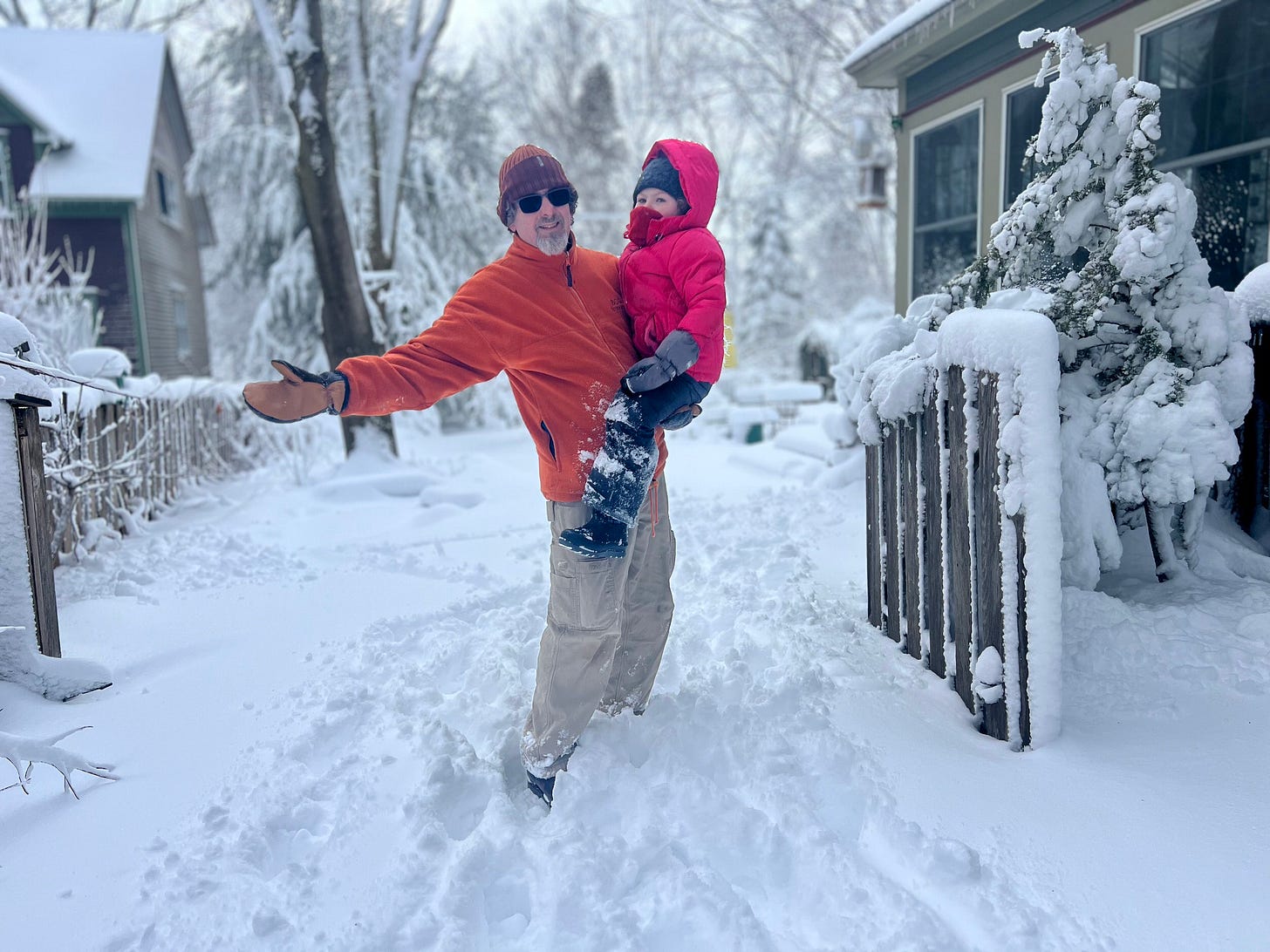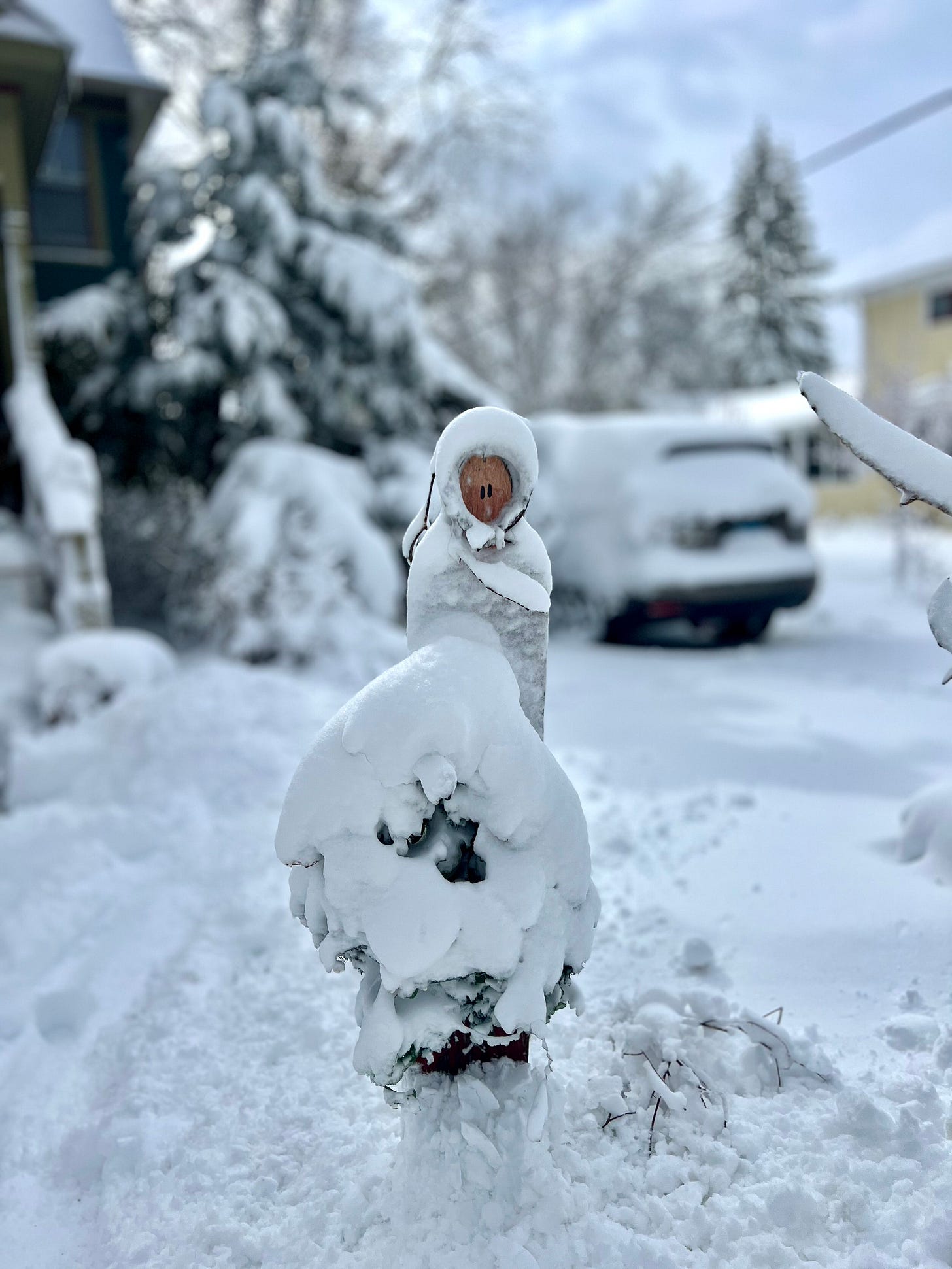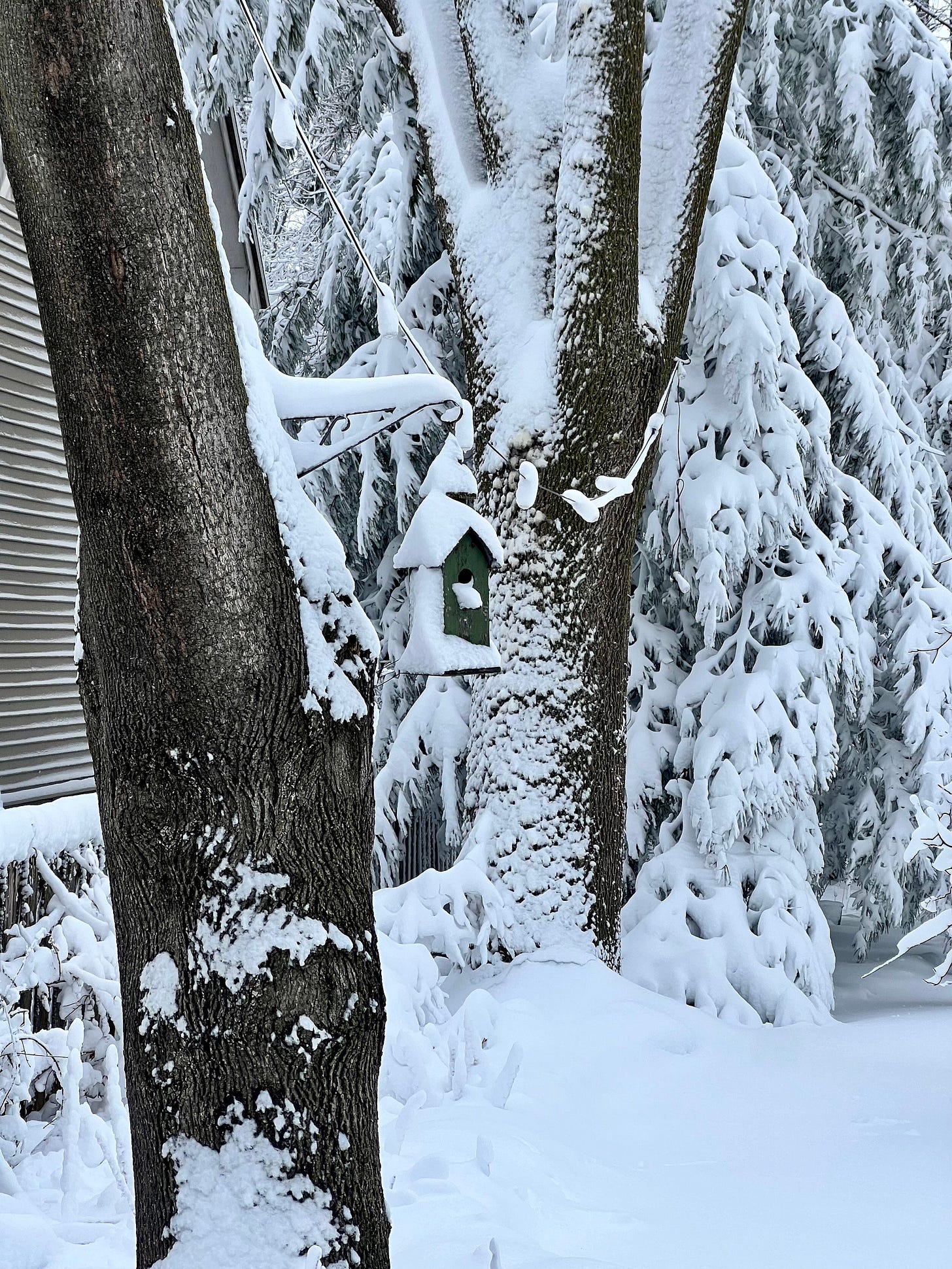Fresh Snow and Solitude. Pondering RM Rilke’s invitation.
A poetic (mid) weekly blessing for all who seek renewal.
Dear fellow pilgrim,
We woke up to a snow day in Minnesota. Overnight, the heavens opened, releasing what they had held back all winter months—much like floodgates unleashing the world's accumulated heaviness all at once.
I am glad it did not rain ashes!
Instead, the heavens took mercy and overnight draped the cold, gray land in a white blanket, and it was born again.
So we spent the morning digging ourselves out of wonder land. School was called off and we got a plan for homeschooling via email. I have no idea how single parents with kids do all of this. For us, a retired professor and an independent writer and a 5 year old this all was just fun.
Nature has wonderful ways to call us into the moment, away from our whatever-we-think-important to the life in front of us. Sometimes there is nothing more important than the 9 inches snow on your front stoop, not even the state of the world, straining to attract your attention.
While my husband and little one abandoned the digging soon to build a snowman, I ventured into the backyard. Walking through the deep snow toward the back, the snow-draped branches of our evergreens formed a natural canopy, reminding me of the “cloister walk”— the covered passage that connects the inner courtyard with the rooms of the monastery.
My breath became slower and deeper as I leaned into the winter wonderland.
Perhaps it's just me, but freshly fallen snow feels like a multi-layered blessing—a quiet blanket that dampens all noise and invites me into solitude.
To walk inside yourself
Last Saturday, we met the first time this year with our community here at the Cloister for a mini-retreat. We met to practice solitude in communion.
An invitation to pause, despite the distractions. To look inside ourselves and craft a space of welcome.
To take a moment to ground ourselves in ourselves during a time when everything around us is in frantic movement.
Together we meditated on a brief text by R.M. RILKE.
And so today, at the beginning of this Lenten season, we extend this invitation to solitude to each of you. Not to flee from the needs of time, but to ground ourselves so we can respond to them properly.
This insight has probably never been more beautifully said than by the German writer Rainer Maria Rilke. In a letter to a young poet who struggled with his loneliness around Christmas time, he writes the following:
"My dear Mr. Kappus,
I don't want you to be without a greeting from me when Christmas comes and when you, in the midst of the holiday, are bearing your solitude more heavily than usual. But when you notice that it is vast, you should be happy; for what (you should ask yourself) would a solitude be that was not vast; there is only one solitude, and it is vast, heavy, difficult to bear, and almost everyone has hours when he would gladly exchange it for any kind of sociability, however trivial or cheap, for the tiniest outward agreement with the first person who comes along, the most unworthy. But perhaps these are the very hours during which solitude grows; for its growing is painful as the growing of boys and sad as the beginning of spring. But that must not confuse you.
What is necessary, after all, is only this: solitude, vast inner solitude. To walk inside yourself and meet no one for hours - that is what you must be able to attain. To be solitary as you were when you were a child, when the grownups walked around involved with matters that seemed large and important because they looked so busy and because you didn't understand a thing about what they were doing...."
Our culture today has not much room for such times of "vast inner solitude," that call us to step out of the business of our daily routine, of the noisiness with which we surround ourselves, to "walk inside ourselves" in order to find what still lies hidden.
But this being alone with oneself is very different from being lonely. As with all experience from the inner realm, it cannot be described in objective language. Because being alone can lead the unwary into loneliness, melancholy and despair; but learning to be alone the right way can also make a way to heal our deepest loneliness and discover our deepest longing.
One of my fondest memories of starting a new year was a contemplative cloister retreat we led at St. John's Abbey, MN a couple of years ago. When we arrived at the meeting place on the second morning of our retreat, we found our guests already sitting by and with each other, silently, while reading and waiting.
There was such a beautiful, quiet, energy of community in the room, of anticipation and togetherness while still being alone with one's own thoughts.
D BONHOEFFER has remarked on this "dialectical character" of solitude in his book Living Together:
Only in community do we learn to be rightly alone, and only in aloneness do we learn to live rightly in community. And he advises us to grant each other spaces where we can practice solitude. Just as the day together will be unfruitful without the day alone, after a time of quiet we will meet each other in a different and fresh way again.
The mark of solitude is silence, as speech is the mark of community. Silence and speech have the same inner correspondence and difference as do solitude and community. One does not exist without the other. Right speech comes out of silence, and right silence comes out of speech.
— Dietrich Bonhoeffer (1954). “Life Together”
Practicing Solitude
Read the Rilke piece again, slowly, if possible aloud. Here are some questions to ponder:
When you read Rilke's lines on the mixed appearances of solitude, what experiences or times of your own life come to mind?
When has solitude knocked at your door last?
What or whom have you met when you walked the last time "inside yourself"?
Can you find an image or line for this encounter?
Does it encourage you to try again?
A Blessing for your Lent
shared this blessing today with her readers and I am glad to sharing it with you now. May it bring calm and consolation to your Lenten journey.
ASH WEDNESDAY
— by J. Barrie Shepherd
Why not
Affirm yourself this Lent.
Be kind and gentle to your you.
Go walking, learn to breathe, read a book,
Know bread, and wine and flesh,
Love yourself
Enough to give it
As a gift of love to life,
Or death.
Share hope with one who mourns,
Grief with one who laughs,
And rediscover all the yous
You left behind in getting to this place
From which, with ashes on your head, you go
In search of Easter.
Peace and blessings,
Almut
PS: If you can, leave a heart, a word or a line which resonated with you in the comments, so we know you have been here :-)
In case you missed it
My latest “Letter to America:”
About Cloister Notes
A letter for dancing monks and weary pilgrims in the intersection of psychology, philosophy and spirituality. Contemplations on being human to deepen your path, nourish your heart and build wisdom within.
About Almut
Almut Furchert, Dr. phil., Dipl. Psych. is a German American scholar and practitioner, a psychologist turned philosopher turned writer, traveler, photographer, retreat leader and mother of a kindergartener. She has taught and published on authors like Kierkegaard, Buber, Frankl, Yalom, Edith Stein, and Hildegard of Bingen. Almut is also a Benedictine Oblate and lives with her family in a little college town in MN.
You can manage your subscription here.














Almut,
Thank you always for offering these reflections, inviting my own. I was with you for the St Johns New Years retreat in 2015-6, and it resides in my bones.
Many times the words you offer in your posts bring it back. Today with:
“And rediscover all the yous
You left behind in getting to this place”
I enter Lent graced by the intentions you’ve framed on my behalf.
Thank you for this! I will spend some time in solitude with what you have shared. You are a blessing.